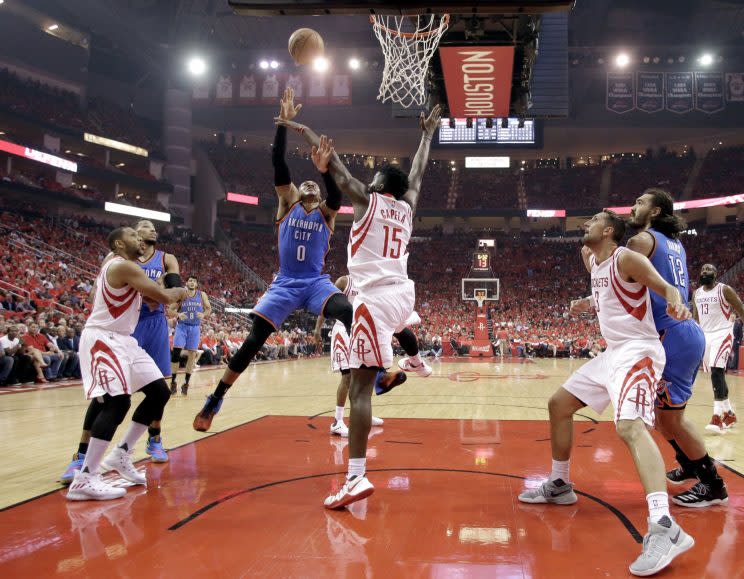The Rockets advanced, but Russell Westbrook and the Thunder were the story once again

The Western Conference playoff series between the Houston Rockets and Oklahoma City Thunder was billed as the most exciting matchup of the first round and a chance for top MVP candidates James Harden and Russell Westbrook to face off for bragging rights, if not the actual hardware. It was to be a titanic battle between two of the game’s brightest superstars — exactly the kind of storyline that is supposed to define the postseason.
The reality was much less watchable than anticipated, but perhaps more dramatic for it. The Rockets finished off a five-game elimination of the Thunder on Tuesday night, coming back from a five-point deficit through three quarters to win 105-99. As in previous games of the series, the style of basketball on display was often ragged and occasionally downright hideous. However, that ugliness brought out some of the most important qualities in both teams and expressed many of the differences between them, including those involving a superstar who does a lot and one who does nearly everything.
[Follow Ball Don’t Lie on social media: Twitter | Instagram | Facebook | Tumblr]
However, the most important stretch of the game occurred with neither Harden nor Westbrook on the court. OKC entered the fourth quarter up 77-72 after a terrific third in which Westbrook scored 20 of the team’s 33 points to turn around a seven-point halftime deficit. Holding a material lead, head coach Billy Donovan opted to rest his superstar in the hope that the team’s secondary players could buck the trend of the series and maintain the advantage.
It did not go as planned. The Rockets outscored the Thunder 14-4 in the mere 2:45 Westbrook sat to turn a five-point lead into a five-point deficit. He returned out of a timeout pressing to get OKC back into the game, and the desperation was apparent. Westbrook shot 2 of 10 in the period (including 0 of 5 from beyond the arc) in a performance similar to the one he put forth in the fourth quarter of Game 2. He tried to do too much, yes, but no one else seemed capable of doing much to help him. The Thunder stayed relatively close and had chances to tie the game late, but their season died as it lived — with Westbrook taking on more responsibilities than any player has in recent NBA history.
It’s probably not worth rehashing all the arguments over Westbrook after 87 games in 2016-17 and plenty more in previous seasons. Nevertheless, what was remarkable about the finish to Game 5 was that nearly all of those familiar points seemed true.
Those prone to harp on Westbrook’s weaknesses could point to his insistence on taking 18 3-pointers despite making only five, his lack of trust in his teammates (including on one play where he appeared to block Jerami Grant’s putback attempt), and a seeming inability to find a good shot in crunch time. But those who are inclined to see things from Westbrook’s point of view had plenty of evidence for their case, too.
The Thunder really couldn’t do anything without Westbrook on the floor this entire series. There were gaps everywhere — Andre Roberson was a major liability as a target of intentional fouls, but had to play for his defensive value, and at times every lineup looked like Westbrook and four players who excel at tapping the ball out on offensive rebounds. Is it really fair to cry “inefficiency” over someone who puts up 47 points, 11 rebounds, and nine assists when his teammates do so little to help him?
All these factors played out over the fourth quarter in a scene that often seemed more like a trial than a basketball game. Debates over Westbrook have dominated this season, and Game 5 was something like a closing argument. I suppose that makes June’s MVP announcement the verdict, although it’s a safe bet that everyone will continue to hold the same opinions about him regardless of what happens two months from now.
In such a scenario, the Rockets looked less like the team in control than the beneficiaries of a crisis they didn’t have to solve. But the Rockets’ calm under pressure was itself one of the reasons they won this series — in fact, they actively created many of the situations that foiled the Thunder throughout this series. Mike D’Antoni’s decision to force Roberson to the free-throw line exemplified his decision to forgo his personal preferences and muck up the pace, which also allowed Harden to thrive in a stop-start, foul-laden game. His 34 points were somewhat quiet, but any game in which he takes 17 free throws bears his imprint.
Yet the other Rockets were ultimately the difference in this series. Lou Williams contributed 22 points (7-of-14 FG) to continue a stellar series in which he offered Houston the bench option that OKC sorely lacked. He scored 10 of the 14 points in the Rockets’ game-changing run to start the final period and made a big impact on a night when Eric Gordon, Ryan Anderson and Trevor Ariza combined to shoot just 1 of 16 from 3-point range.
Perhaps the lesson of this series is simpler than the interminable exegesis of Westbrook lets on. The Rockets didn’t advance because Harden plays for his teammates more than Westbrook does, but because he has better teammates. Maybe everything else is just a matter of personal taste.
– – – – – – –
Eric Freeman is a writer for Ball Don’t Lie on Yahoo Sports. Have a tip? Email him at efreeman_ysports@yahoo.com or follow him on Twitter!
More from Yahoo Sports:
• The final 2017 NFL mock drafts from Yahoo Sports
• Gregg Popovich leaves massive tip on $815 bill
• 17-year-old could be baseball’s LeBron James
• Tim Brown: Why we shouldn’t slam unlikely MLB slugger




